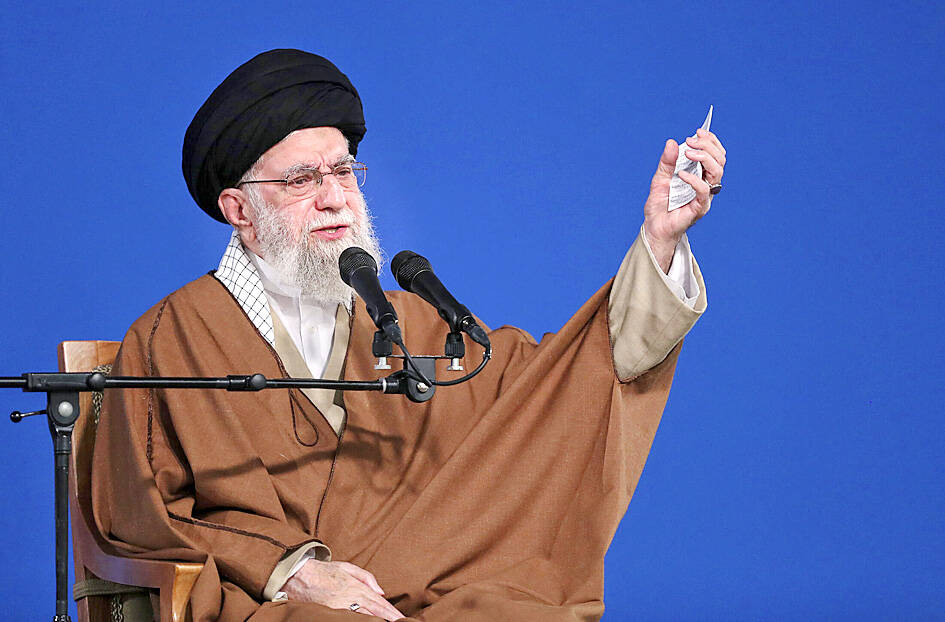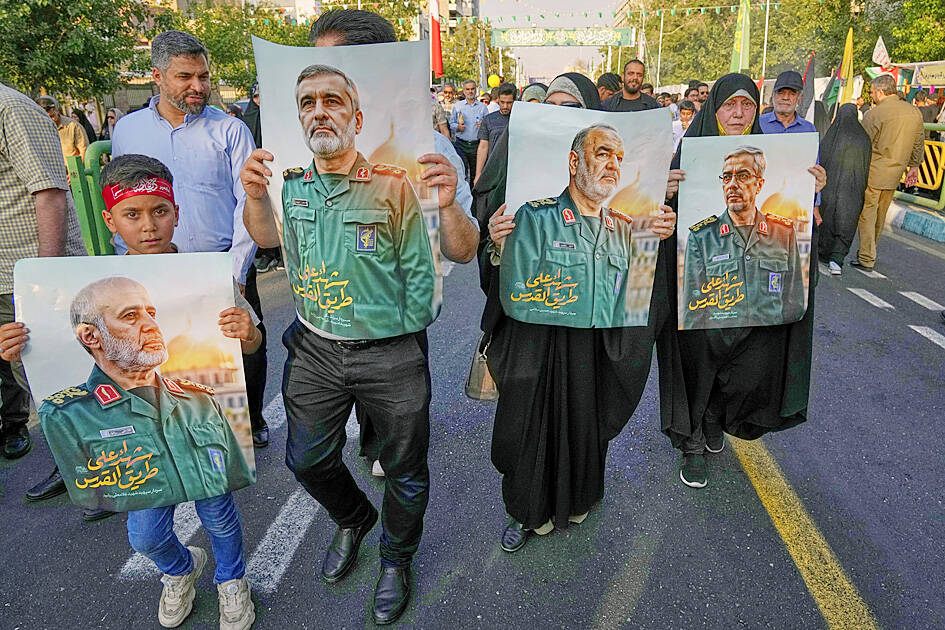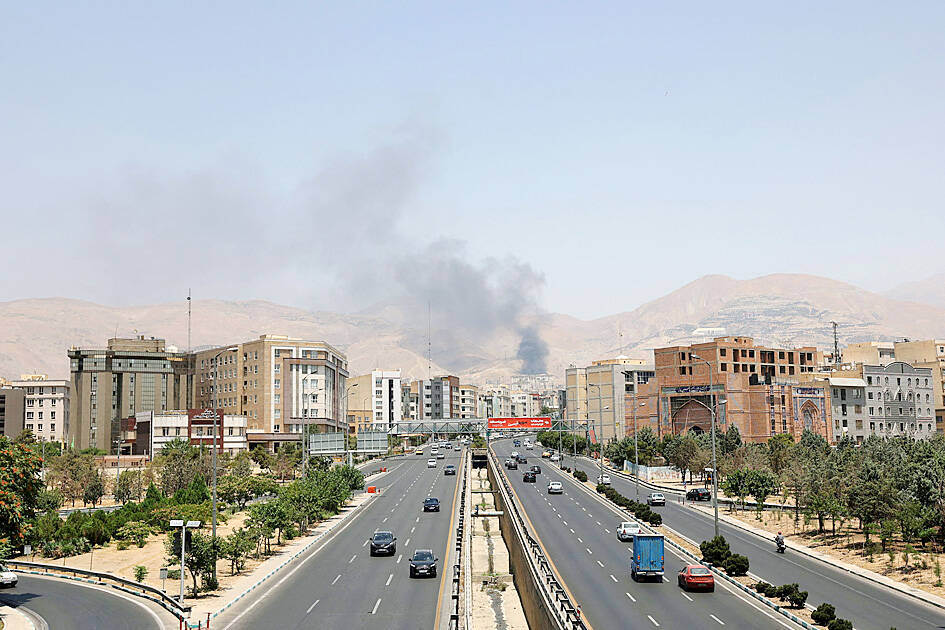Israel’s sweeping campaign of airstrikes aims to do more than destroy Iran’s nuclear centrifuges and missile capabilities. It seeks to shatter the foundations of Iranian supreme leader Ayatollah Ali Khamenei’s government and leave it near collapse, Israeli, Western and regional officials said.
Israeli Prime Minister Benjamin Netanyahu wants Iran weakened enough to be forced into fundamental concessions on permanently abandoning its nuclear enrichment, its ballistic missile program and its support for militant groups across the region, the sources said.
He also wants to leave Khamenei’s government debilitated. The campaign is about “exhausting the regime’s ability to project power and maintain internal cohesion,” one senior regional official said.

Photo: AP
Iran’s Islamic government faces an existential crisis unlike anything since the 1979 Revolution — not even the brutal 1980 to 1988 Iran-Iraq war posed such a direct threat to clerical rule. Israel, the Middle East’s most advanced military, can strike anywhere in Iran with drones and advanced F-35 fighter jets, assassinations by Mossad operatives, and cyberwarfare technology.
In recent days, Israel has broadened its targets to include government institutions such as the police and state television headquarters in Tehran. Netanyahu’s government is planning for at least two weeks of intense airstrikes, although the pace depends on how long it takes to eliminate Iran’s missile stockpiles and launch capacity, four government and diplomatic sources said.
Dennis Ross, a former Middle East envoy and advisor to several US administrations, said Iran is feeling the pressure and might be inching toward the negotiating table after the strikes eliminated much of Khamenei’s inner circle, damaged nuclear infrastructure and missile sites, and killed top security figures.

Photo: AP
Despite US President Donald Trump’s belligerent tone in recent days, he would likely accept if Tehran offered a credible path to a deal, Ross said.
However, after Tehran offered no concessions during six previous rounds of nuclear negotiations with the US, Washington would need firm assurances from Iran that its goals, including the permanent abandonment of enrichment, would be met before it would support a ceasefire, he said.
“I think the cost to them is going to be high,” he added.

Photo: Reuters
For Iran, there is one key calculation: letting the 86-year-old Khamenei retreat without humiliation, two Iranian sources said. Strip him of dignity or the prospect of survival, and he might choose all-out conflict, they added.
After Trump demanded Iran’s “unconditional surrender” on social media on Tuesday, Khamenei promised in a televised speech that any US military intervention in Iran would be met with “irreparable damage.”
In recent days, Netanyahu has also overtly raised the prospect of regime change, promising Iranians “the day of liberation is coming.”
However, with the Iranian opposition fragmented and no signs of divisions within the powerful Iranian Revolutionary Guard, which has nearly 250,000 fighters, including its Basij militia volunteers, there is scant prospect that Iran’s ruling elite would collapse easily.
There have been no major protests on the streets of Tehran, and many Iranians profess anger toward Israel for the attacks. Without a ground invasion or domestic uprising, regime change in Iran is a distant prospect, the officials said.
Mark Dubowitz, chief executive at the Foundation for Defense of Democracies think tank in Washington, said Trump ultimately wanted a diplomatic solution, but he was likely to allow Israel more time to pursue its military campaign to give the US more leverage at the negotiating table.
Dubowitz, an Iran expert who has been consulted by the Trump administration on its policy, said Israel’s main objective appears to be setting back Iran’s nuclear program as many years as possible. Central to that is removing its human capacity by killing nuclear and weapons scientists, Dubowitz said, adding that his team had identified 10 to 12 more who are likely being hunted by Israel.
Israel’s assassination of Hezbollah leader Hassan Nasrallah in September plunged the Lebanese group into disarray, but regional officials and observers warned that killing the ageing Khamenei would not have the same impact.
“Real power now resides with his son, Mojtaba, and the IRGC, which is deeply embedded despite the loss of key commanders,” one regional source said. “They remain the regime’s spine.”
Killing Khamenei, a religious leader to millions of Shiites, could cause a major backlash.
Jonathan Panikoff, a former deputy US national intelligence officer on the Middle East during Trump’s first term, said that if the Israeli campaign does foment regime change in Iran, it could result — at least initially — in a more hardline administration.
“What is likely to follow a theocratic Iranian government is not democracy but Islamic Revolutionary Guard Corps–istan,” said Panikoff, now at the Atlantic Council think-tank. “Israel might find itself in a perpetual, ongoing, and far more intense war that is no longer in the shadows.”
If the conflict does escalate, regional officials fear a collapse of Khamenei’s government would not lead to democracy, but to fragmentation — or worse: a civil war, fueled by Iran’s marginalized minorities — Arabs, Kurds, Azeris, Baha’is, Baluchis and Christians — could erupt in a dangerous power vacuum.
“And that, no one is ready for,” a Gulf source said.
Alex Vatanka, director of the Iran Program at the Middle East Institute, based in Washington, said that shockwaves from the collapse of the government in Tehran would not stop at Iran’s borders.
“A destabilized Iran could ignite unrest from Azerbaijan to Pakistan. Its collapse would reverberate across the region, destabilizing fragile states and reigniting dormant conflicts,” he said.

VAGUE: The criteria of the amnesty remain unclear, but it would cover political violence from 1999 to today, and those convicted of murder or drug trafficking would not qualify Venezuelan Acting President Delcy Rodriguez on Friday announced an amnesty bill that could lead to the release of hundreds of prisoners, including opposition leaders, journalists and human rights activists detained for political reasons. The measure had long been sought by the US-backed opposition. It is the latest concession Rodriguez has made since taking the reins of the country on Jan. 3 after the brazen seizure of then-Venezuelan president Nicolas Maduro. Rodriguez told a gathering of justices, magistrates, ministers, military brass and other government leaders that the ruling party-controlled Venezuelan National Assembly would take up the bill with urgency. Rodriguez also announced the shutdown

Civil society leaders and members of a left-wing coalition yesterday filed impeachment complaints against Philippine Vice President Sara Duterte, restarting a process sidelined by the Supreme Court last year. Both cases accuse Duterte of misusing public funds during her term as education secretary, while one revives allegations that she threatened to assassinate former ally Philippine President Ferdinand Marcos Jr. The filings come on the same day that a committee in the House of Representatives was to begin hearings into impeachment complaints against Marcos, accused of corruption tied to a spiraling scandal over bogus flood control projects. Under the constitution, an impeachment by the

Exiled Tibetans began a unique global election yesterday for a government representing a homeland many have never seen, as part of a democratic exercise voters say carries great weight. From red-robed Buddhist monks in the snowy Himalayas, to political exiles in megacities across South Asia, to refugees in Australia, Europe and North America, voting takes place in 27 countries — but not China. “Elections ... show that the struggle for Tibet’s freedom and independence continues from generation to generation,” said candidate Gyaltsen Chokye, 33, who is based in the Indian hill-town of Dharamsala, headquarters of the government-in-exile, the Central Tibetan Administration (CTA). It

China executed 11 people linked to Myanmar criminal gangs, including “key members” of telecom scam operations, state media reported yesterday, as Beijing toughens its response to the sprawling, transnational industry. Fraud compounds where scammers lure Internet users into fake romantic relationships and cryptocurrency investments have flourished across Southeast Asia, including in Myanmar. Initially largely targeting Chinese speakers, the criminal groups behind the compounds have expanded operations into multiple languages to steal from victims around the world. Those conducting the scams are sometimes willing con artists, and other times trafficked foreign nationals forced to work. In the past few years, Beijing has stepped up cooperation